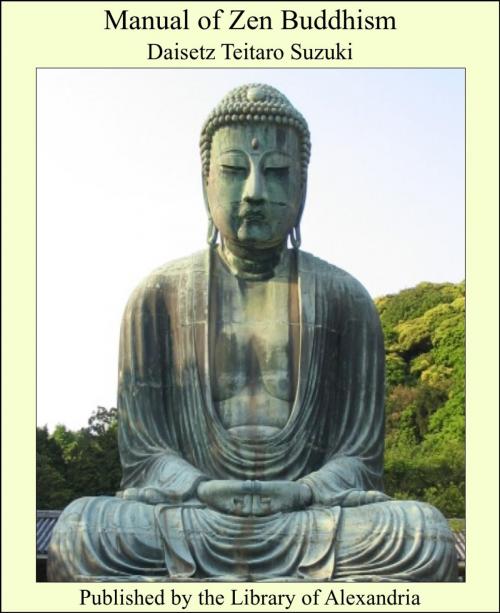| Author: | Daisetz Teitaro Suzuki | ISBN: | 9781465537164 |
| Publisher: | Library of Alexandria | Publication: | July 29, 2009 |
| Imprint: | Library of Alexandria | Language: | English |
| Author: | Daisetz Teitaro Suzuki |
| ISBN: | 9781465537164 |
| Publisher: | Library of Alexandria |
| Publication: | July 29, 2009 |
| Imprint: | Library of Alexandria |
| Language: | English |
Dr. Suzuki writes with authority. Not only has he studied original works in Sanskrit, Pali, Chinese and Japanese, but he has an up-to-date knowledge of Western thought in German and French as well as in the English which he speaks and writes so fluently. He is, moreover, more than a scholar; he is a Buddhist. Though not a priest of any Buddhist sect, he is honoured in every temple in Japan, for his knowledge of spiritual things, as all who have sat at his feet bear witness, is direct and profound. When he speaks of the higher stages of consciousness he speaks as a man who dwells therein, and the impression he makes on those who enter the fringes of his mind is that of a man who seeks for the intellectual symbols wherewith to describe a state of awareness which lies indeed “beyond the intellect”. To those unable to sit at the feet of the Master his writings must be a substitute. All these, however, were Out of print in England by 1940, and all remaining stocks in Japan were destroyed in the fire which consumed three-quarters of Tokyo in 1945. When, therefore, I reached Japan in 1946, I arranged with the author for the Buddhist Society, London—my wife and myself as its nominees—to begin the publication of his Collected Works, reprinting the old favourites, and printing as fast as possible translations of the many new works which the Professor, self-immured in his house at Kyoto, had written during the war. This undertaking, however, was beyond the powers of the Buddhist Society, and we therefore secured the assistance of Rider and Co., who, backed by the vast resources of the House of Hutchinson, can honour the needs of such a considerable task. Of Zen itself I need say nothing here, but the increasing sale of books on the subject, such as The Spirit of Zen by Alan Watts (Murray), and the series of original translations of Chinese Zen Scriptures and Other works published by the Buddhist Society prove that the interest of the West is rising rapidly. Zen, however, is a subject extremely easy to misunderstand, and it is therefore important that the words of a qualified Master should come readily to hand
Dr. Suzuki writes with authority. Not only has he studied original works in Sanskrit, Pali, Chinese and Japanese, but he has an up-to-date knowledge of Western thought in German and French as well as in the English which he speaks and writes so fluently. He is, moreover, more than a scholar; he is a Buddhist. Though not a priest of any Buddhist sect, he is honoured in every temple in Japan, for his knowledge of spiritual things, as all who have sat at his feet bear witness, is direct and profound. When he speaks of the higher stages of consciousness he speaks as a man who dwells therein, and the impression he makes on those who enter the fringes of his mind is that of a man who seeks for the intellectual symbols wherewith to describe a state of awareness which lies indeed “beyond the intellect”. To those unable to sit at the feet of the Master his writings must be a substitute. All these, however, were Out of print in England by 1940, and all remaining stocks in Japan were destroyed in the fire which consumed three-quarters of Tokyo in 1945. When, therefore, I reached Japan in 1946, I arranged with the author for the Buddhist Society, London—my wife and myself as its nominees—to begin the publication of his Collected Works, reprinting the old favourites, and printing as fast as possible translations of the many new works which the Professor, self-immured in his house at Kyoto, had written during the war. This undertaking, however, was beyond the powers of the Buddhist Society, and we therefore secured the assistance of Rider and Co., who, backed by the vast resources of the House of Hutchinson, can honour the needs of such a considerable task. Of Zen itself I need say nothing here, but the increasing sale of books on the subject, such as The Spirit of Zen by Alan Watts (Murray), and the series of original translations of Chinese Zen Scriptures and Other works published by the Buddhist Society prove that the interest of the West is rising rapidly. Zen, however, is a subject extremely easy to misunderstand, and it is therefore important that the words of a qualified Master should come readily to hand















